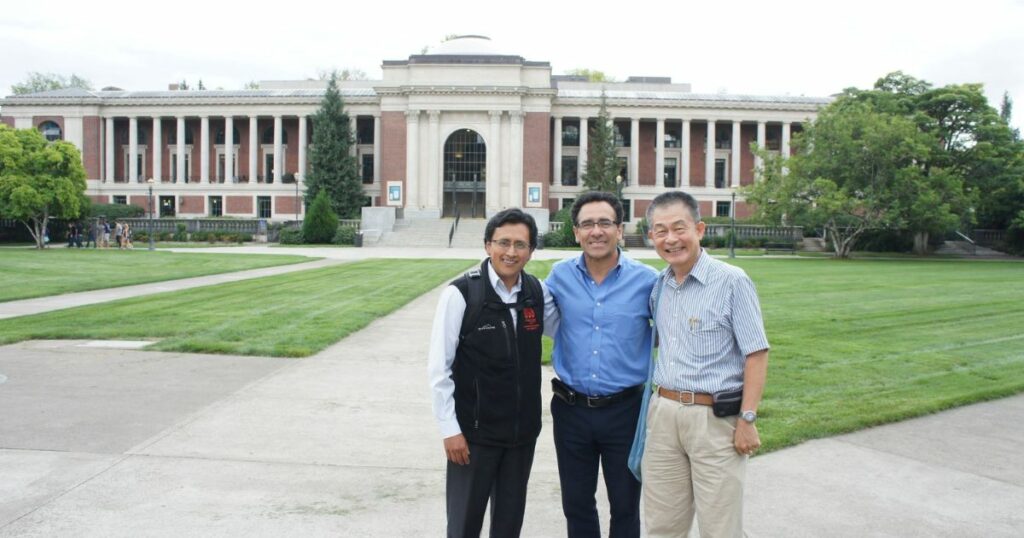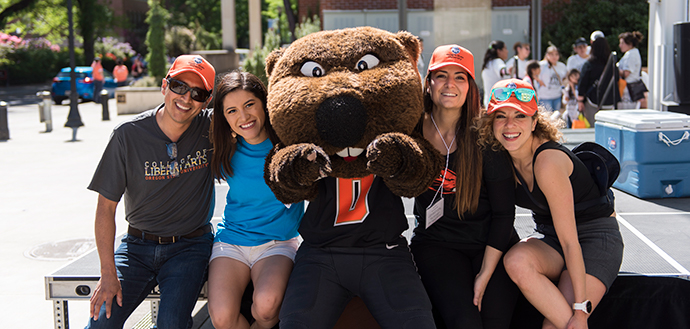
Daniel López-Cevallos, PhD ’08, remembers what it was like to be the first in his family to attend college. To be an international student immersed in an English-only classroom for the first time. To help students with calculus as a teaching assistant. To conduct research as an undergraduate. To realize the power of supportive mentors.
He not only remembers, but he uses these experiences to inform his work as Oregon State’s new assistant vice provost for undergraduate education, a broad role that supports undergraduate research, active learning experiences and other initiatives aimed at improving students’ development and success.
He’s committed to being intentional and thinking hard about the transitions that students experience in navigating education. This includes finding ways to better integrate undergraduates into university life, particularly older students, students of color, transfer students, military students and others who don’t fit the traditional mold.
Students like himself.
The power of mentors
When Daniel met Chunhuei Chi in the second year of his master’s program, Chunhuei encouraged him to pursue a PhD in global health.
He had his doubts. And that’s when he learned the power of mentors. His was Fernando Ortega, MD, PhD ’00, whom he says was instrumental in helping him get over his fears and taking Chunhuei’s advice to apply to Oregon State. Fernando is faculty in the School of Public Health at the Universidad San Francisco de Quito (USFQ) in Ecuador, where he served as dean. Fernando is also a former student of Chunhuei’s and met Daniel at USFQ.
“When I was finishing my master’s degree, I thought I would work for a few years. But Fernando encouraged me that all of the pieces were in place and I should go. I consider him one of my professional parents. Mentors help you see possibilities and break down barriers so that new paths are available.”
Daniel, in turn, paid his positive mentorship forward to student Kristty Polanco, MPH ’16, now public health administrator at Polk County Public Health. She considers Daniel one of her greatest mentors.
“One of the best things about his mentorship is his emphasis on gaining practical, real-life experience,” she says. “He was the first professor who connected me to internship opportunities. His program planning and evaluation classes during my undergraduate program were the most challenging, but because they were both connected to existing community programs, I learned valuable skills that paved my public health career. These skills landed me an internship at Benton County Health Department, where I later became a community health worker.
“One of the many lessons I learned from Daniel is the importance of keeping the community at the center of public health initiatives. His ability to humbly connect with community members to leverage their voice and needs to adapt programming and policy making recommendations is truly inspiring.”
A seat at the table
A key lesson that Daniel learned is the power of being in positions where decisions are made.
“One thing I’ve learned in my career and from my mentors is that folks being affected by decisions need to be at the table. In their absence, assumptions are made and stereotypes and biases fill in the void. On the other hand, building coalitions, which comes from a long history of public health and community organizing, means you have a more powerful voice.”
He was introduced to public health in his first career as an optometrist, where he found himself thinking about the different barriers, including discrimination, that patients face.
“Public health, in my case, came to light when I drew connections between the discipline and ethnic studies,” he says. “To me, public health is the ability to broaden impact.”
“Traditionally, we think about resolving the health issues of one person, and we use all resources for one patient. Public health is thinking about broader implications and programming and what populations would benefit the most or least, about what populations are being left behind and how we equalize access and opportunity.
“With public health, we can see that health has a place and potential for leverage around a number of societal issues, including food, transportation and more, because it affects the health of communities and particularly disadvantaged communities that need to have a seat at the decision-making table.
“It’s also the ability to hone skills in building community and coalitions and working together to find solutions. Public health holds that promise.”
Daniel’s research has evaluated discrimination, medical mistrust, social and cultural issues that affect people’s timely access to health care services, and the intersections of race, ethnicity, gender, immigration and socioeconomic status.
“How people perceive you, and how you think others perceive you, has an effect on your health. It becomes a wide brush to paint people with that is dehumanizing and has real implications for access to health care services and also health and well-being,” he says.
“The damage isn’t just for this population, but for others as well. We need to get past stereotypes and initial assumptions and those structures and oppressive systems and ways in which institutions operate traditionally,” he says. “By embracing inclusivity, you think you’re doing someone a favor, but in reality it benefits us all.”
Daniel’s public health background provides a lens through which he views his work at the university and beyond.
“Looking not at individual issues but at populations, communities and systems, you see the bigger picture. This important perspective prompts us and our community partners to be at the table where decisions and priorities are being made.”
“Daniel is very self-motivated and a warm and caring person,” says Professor Chunhuei Chi. “He cares deeply and passionately, is a hard worker and very productive. His engagement in and outside of OSU makes him a strong leader.”
Historical fact
Professors Chunhuei Chi and Vicki Ebbeck share the spot for third longest tenure in the college, having joined in 1990. Only Associate Professor Anthony Veltri has a longer tenure.
Fun fact
Daniel met his wife, Megan Patton-Lopez, while earning his PhD at OSU. Megan, who studied community nutrition, graduated with her PhD from the CPHHS in 2012. The couple has one daughter, Eva.
At a glance

Daniel López-Cevallos, PhD
Assistant vice provost for undergraduate education
In his new role, Daniel will lead projects to advance undergraduate student success and improve access to high-impact experiences for all undergraduates.
Career Highlights
- Assistant Vice Provost for Undergraduate Education, 2019-present
- Vice-Chair of the Oregon Commission on Hispanic Affairs, 2018-present
- Associate Professor (tenured) of Latina/o/x Studies and Ethnic Studies in OSU’s College of Liberal Arts, 2018-present
- Evaluator of the Open Campus Juntos Program, 2015-2019
- Assistant professor of Latina/o/x Studies and Ethnic Studies in OSU’s College of Liberal Arts, 2012-2018
- Associate Director of Research with OSU’s Center for Latina/o Studies and Engagement, 2012 -2017
- Visiting Professor at Universidad San Francisco de Quito’s School of Public Health, 2014-2015
- Assistant Professor of Community Health at Western Oregon University, 2008-2012
- PhD in global health, OSU’s CPHHS, 2008
- BS and MPH, Universidad San Francisco de Quito, Ecuador
- Co-Chair of the Latino Caucus Scientific Program of the American Public Health Association, 2015-2018